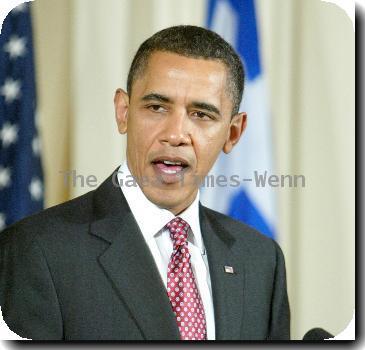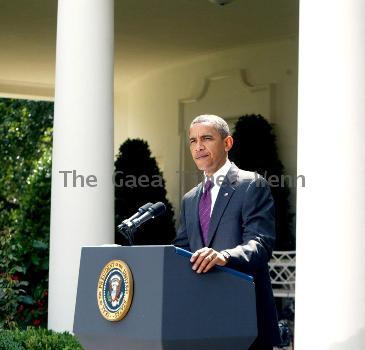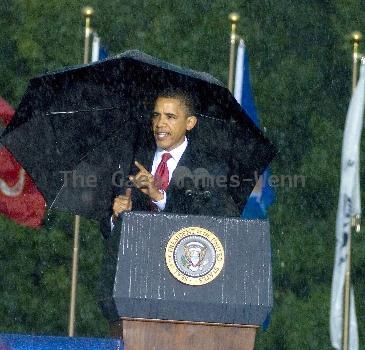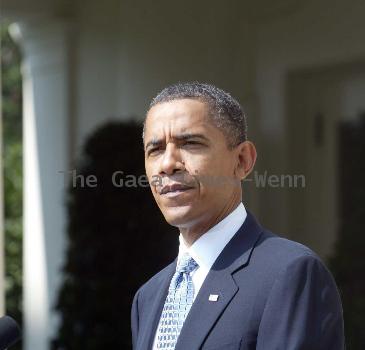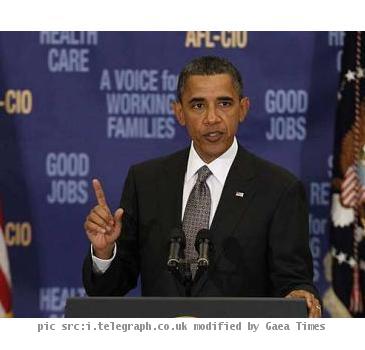As peace talks begin, Obama and Netanyahu condemn latest killings, vow to go forward
By Robert Burns, APWednesday, September 1, 2010
Obama, Netanyahu condemn killings as talks open
WASHINGTON — Condemning Mideast peace “rejectionists,” President Barack Obama convened a new round of ambitious talks Wednesday and vowed not to allow a fresh burst of violence dim hopes for an accord creating a sovereign Palestinian state beside a secure Israel.
Obama, who met separately at the White House with Israeli Prime Minister Benjamin Netanyahu and Palestinian President Mahmoud Abbas, assailed those responsible for the killings of four Israelis near the West Bank city of Hebron. The militant Hamas movement, which rejects Israel’s right to exist and opposes peace talks, claimed responsibility.
Direct Israeli-Palestinian negotiations broke off nearly two years ago, in December 2008, and the Obama administration spent its first 20 months in office coaxing the two sides back to the bargaining table. Obama was adamant Wednesday that extremist violence would not derail the process.
“There are going to be extremists and rejectionists who, rather than seeking peace, are going to be seeking destruction,” he said. “The United States is going to be unwavering in its support of Israel’s security. And we are going to push back against these kinds of terrorist attacks. And so the message should go out to Hamas and everyone else who is taking credit for these heinous crimes that this is not going to stop us.”
Expectations for the Washington talks are low, yet the stakes are high. The Israeli-Palestinian conflict is a constant source of grievance and unrest in the Muslim world. The failure of past peace efforts has left both sides with rigid demands and public ambivalence about the value of a negotiated settlement.
American officials are hopeful they can at least get the two sides this week to agree to a second round of talks, likely to be held in the second week of September. That could be followed by another meeting between Obama, Netanyahu and Abbas on the sidelines of the U.N. General Assembly near the end of the month in New York. The stated goal is to reach a final peace settlement within one year.
In a carefully arranged series of talks designed to lay the final groundwork for formal negotiations, Obama met separately with Netanyahu and Abbas and also was holding sessions with Jordan’s King Abdullah II and Egyptian President Hosni Mubarak.
The five leaders were to gather afterward for dinner, a private prelude to Thursday’s scheduled start of formal negotiations at the State Department.
Obama and Netanyahu made a point of jointly condemning the shootings of the Jewish settlers, standing together before cameras and reporters at the White House to portray the perpetrators as enemies of peace. Netanyahu said the killings were carried out by people who “trample human rights into the dust and butcher everything they oppose.”
A spokesman for Abbas, Nabil Abu Redeineh, told reporters before the Palestinian leader went to the White House that negotiations with the Israelis will fail almost as soon as they begin unless Israel extends a moratorium on construction in Jewish settlements in the West Bank. The moratorium is to expire Sept. 26.
Under a so-called two-state solution to the Israeli-Palestinian conflict, the West Bank is supposed to make up the bulk of an independent Palestinian state alongside Israel, with precise borders to be drawn at the peace table. Expansion of Jewish housing makes those borders ever more complicated.
After Abbas’ meeting, Obama said the leaders were “making progress.” Obama was expected to comment in more detail later in the day.
Redeineh, the Abbas spokesman, said early results are important.
“For the fate of the peace process, we are facing an important crossroad,” Redeineh said. Within a month, “either the process will advance, or things will go back to square one again.”
Beyond the settlements, Israel and the Palestinians face numerous hurdles in resolving other contentious issues, notably the borders of a future Palestinian state, the political status of Jerusalem and the fate of Palestinian refugees.
Also complicating the outlook are internal Palestinian divisions that have led to a split between Abbas’ West Bank-based administration and Hamas, which is in control of Gaza. Hamas is not part of the negotiations and has asserted that talks will be futile.
In a statement to be delivered prior to Wednesday’s White House dinner, Netanyahu framed Israel’s ambitions for the peace process.
“Our goal is to forge a secure and durable peace between Israel and the Palestinians,” he said, according to an advance copy of his remarks. “We do not seek an interlude between two wars. We do not seek a temporary respite between outbursts of terror.”
Netanyahu stressed the central importance of security assurances for the Jewish state as part of any land-for-peace agreement with the Palestinians.
“We left Lebanon, we got terror. We left Gaza, we got terror. We want to ensure that territory we concede will not be turned into a third Iranian-sponsored terror enclave aimed at the heart of Israel,” Netanyahu said.
Former Sen. George Mitchell, Obama’s special Mideast peace envoy, said Tuesday that the goal of reaching a Palestinian-Israeli deal within one year is intended to counter a sense among many in the Mideast that years of inconclusive negotiations mean the process is never-ending.
“It’s very important to create a sense that this has a definite concluding point,” said. “And we believe that it can be done.”
Associated Press writers Matthew Lee, Matti Friedman, Abed Arnaout, Ben Feller, Darlene Superville and Julie Pace contributed to this report.
Tags: Africa, Barack Obama, District Of Columbia, Egypt, Gaza Strip, Hebron, International Agreements, Israel, Jerusalem, Middle East, North Africa, North America, Palestinian Territories, Territorial Disputes, United States, Washington, West Bank
